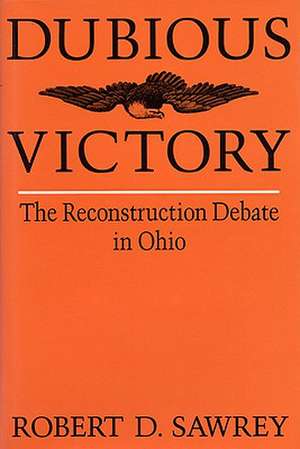Dubious Victory
Autor Robert Sawreyen Limba Engleză Hardback – 7 apr 1992
"To the victors belong the spoils" is a time-honored cliche. When in 1865 northern armies defeated the greatest challenge ever posed to the Union, issues of spoils and peace terms dominated public debate. But precisely what did the victorious North want from the Reconstruction process? Historians generally have shown far less interest in northern goals than in what terms southerners were willing to accept. Robert Sawrey now seeks to redress the balance by examining the post-Civil War attitudes of a representative northern state, Ohio.
Sawrey's probing study explores precisely what the key issues were for politically active Ohioans and what they sought in a Reconstruction policy. Through extensive research in contemporary newspapers, manuscripts, legislative debates, and diaries, he offers the most complete picture ever presented of northern attitudes on the two crucial issues of Reconstruction -- the terms of readmission and the fate of the former slaves.
Ohioans' struggle to find an equation for restoring a Union that now included nearly four million free blacks was complicated, he finds, by their prejudices and their belief in white superiority. Because they regarded the "planter conspiracy" as a primary cause of the war, they sought to assure future peace through control of the planters -- a position that compelled them to advocate basic rights for ex-slaves. At the same time, they continued to support white supremacy throughout the nation. To reconcile these contradictory positions was a daunt-ing task. Yet by 1870, Sawrey finds, most politically involved Ohioans believed Reconstruction had secured their basic goals.
"Dubious Victory" offers a fresh approach to understanding the limits of what was achievable during Reconstruction. It also explains why the achievements of the period now seem to have been so limited.
Preț: 232.84 lei
Nou
44.56€ • 46.24$ • 37.24£
Carte tipărită la comandă
Livrare economică 17-31 martie
Specificații
ISBN-10: 0813117763
Pagini: 216
Dimensiuni: 159 x 237 x 20 mm
Greutate: 0.53 kg
Ediția:New.
Editura: University Press of Kentucky












